Right now, some of your competitors are out there killing it—no matter what industry you’re in.
But you know what? You could easily be the one killing it instead. (And if you already are, then that’s awesome.)
The few superstars in every industry are doing certain things that are making them way more successful than everyone else. And by the way, it has nothing to do with charisma.
Your top competitors aren’t crushing their sales right now because they can tell great jokes, or even because they can build deep relationships.
Instead, there are several sales secrets that top performers are implementing every day—and your competition doesn’t want you to know anything about them.
Because if you do, then you’re suddenly going to be out there killing it, too.
In this video, I’m going to show you 6 sales secrets your competition doesn’t want you to know. Check it out:

Sales Secret #1: Know your lead gen math.
 This sales secret often seems counterintuitive to salespeople. Why? Because few salespeople out there are focused on the math behind their success.
This sales secret often seems counterintuitive to salespeople. Why? Because few salespeople out there are focused on the math behind their success.
Instead, they’re focused on what they have to say, or do, to be successful. But knowing the math behind your lead generation efforts is absolutely critical, too.
This is one of those sales secrets that truly separates top performers from the rest of the pack. Assuming your lead generation processes are strong enough (you have a decent prospecting call, and you send out solid emails), knowing the math behind your lead generation is the next imperative for success.
It’s actually really simple. First, determine your sales goal. How many sales, approximately, do you have to close over the course of the year to reach that sales goal? From there, how many initial prospect meetings do you have to set in order to close that many sales?
Once you know how many meetings you have to set, it’s a question of what different components will lead to setting those meetings. How many emails do you have to send? How many phone calls should you make? How many LinkedIn connections? All those different components have math behind them—and you should know what it is.
This shouldn’t be emotional. Lead generation shouldn’t be about, “Oh, I just have to try harder.” It’s all about the math. Understand exactly what numbers you must implement in order to get to your sales goal. This is a key sales secret that all top salespeople know.
Sales Secret #2: All that matters is what leads to sales.
 When it comes to sales secrets that really make a difference, this one creates a tremendously important distinction. The vast majority of salespeople get so distracted throughout the day by tasks that are not sales-related. But in the end, all that matters is what leads to sales.
When it comes to sales secrets that really make a difference, this one creates a tremendously important distinction. The vast majority of salespeople get so distracted throughout the day by tasks that are not sales-related. But in the end, all that matters is what leads to sales.
Every single task you do that’s not helping you close more sales is ultimately a distraction. You need to become really, really strong at removing all that clutter from your day.
I recently read a famous book by Marie Kondo about removing clutter from our lives. You’ve probably heard of it. A slightly tweaked version of Marie Kondo’s decluttering method can apply powerfully to sales. Think about it this way: Anything in your job that’s not related to closing deals is clutter, and must be thrown away. Period. No exceptions.
I guarantee that your top competitors, those who are absolutely crushing it right now, are solely focusing on what’s helping them to close deals.
Any customer service or operational issues should be passed along to someone else—those aren’t in the sales domain. Become militant about only focusing on the things that lead to sales, because that’s ultimately all that matters.
You only have so many hours in the day. Make sure those hours are spent toward generating sales, and nothing else.
Sales Secret #3: “No” isn’t bad.
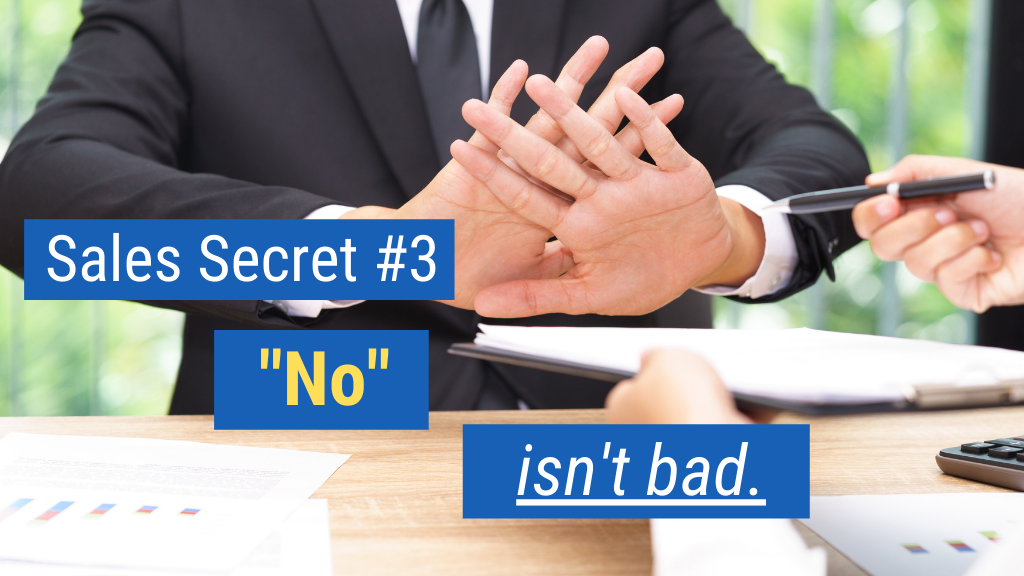 There are three potential outcomes in any selling situation: yes, no, or some wishy-washy version of “I’ll get back to you” or “I need to think it over.” Getting a “yes” is great, of course. And getting a “no” is also a good thing. (The only outcome we want to avoid at all costs is the no-man’s-land “think it over” answer.)
There are three potential outcomes in any selling situation: yes, no, or some wishy-washy version of “I’ll get back to you” or “I need to think it over.” Getting a “yes” is great, of course. And getting a “no” is also a good thing. (The only outcome we want to avoid at all costs is the no-man’s-land “think it over” answer.)
Let me repeat what I just said: Getting a “no” is a good thing. It’s not a bad outcome.
There’s a simple reason why getting a “no” is good: You never want to be pushing your prospects to tell you “yes” because it will ultimately lead to way more “think it overs.” If a prospect doesn’t want to do business with you, then they’re not going to.
So, what you really want to do is actually push prospects toward telling you “no.” This has a reverse effect where prospects are suddenly much more likely to either tell you “no,” or tell you “yes.” And this makes it much less likely that they’ll give you a “think it over” response.
When you make “no” a viable option for prospects, they feel so much less pressure in the selling interaction. This is one of the few really powerful sales secrets that only the best salespeople know. Remember, “think it overs” are what you actually want to avoid. Getting a “no” is fine.
Sales Secret #4: Don’t serve. Help people make the right decision.
 Don’t be a doormat. This shouldn’t be one of the best-kept sales secrets out there, but unfortunately it is. Far too many salespeople are just glorified customer service reps who do whatever the prospect asks. That’s not your job. Your job is not to serve your prospects.
Don’t be a doormat. This shouldn’t be one of the best-kept sales secrets out there, but unfortunately it is. Far too many salespeople are just glorified customer service reps who do whatever the prospect asks. That’s not your job. Your job is not to serve your prospects.
Your job is to serve your clients, sure—but your clients are those who are already doing business with you. Anyone who has not done business with you yet is not a client. They are prospects. And so, your goal is simply to help those people make the right decision.
This means that if someone is not the right fit for you, you don’t owe them anything. That’s a really important distinction. All you should be doing is helping prospects make the right decision—which in many cases will mean doing business with you, but in other cases will not.
If a prospect is a good fit, they should ultimately be making the right decision (with your help), which is to work with you. If they are not the right fit, move on. That’s it. Don’t be a doormat.
Sales Secret #5: Great salespeople aren’t talkative.
 As far as sales secrets go, this might be one of the most surprising to you. We’ve all been bombarded by the myth that effective salespeople are chatty, friendly, super-talkative people. But in reality, the data shows that great salespeople aren’t necessarily extroverts. In fact, most great salespeople fall right in the middle of the spectrum between extroverts and introverts.
As far as sales secrets go, this might be one of the most surprising to you. We’ve all been bombarded by the myth that effective salespeople are chatty, friendly, super-talkative people. But in reality, the data shows that great salespeople aren’t necessarily extroverts. In fact, most great salespeople fall right in the middle of the spectrum between extroverts and introverts.
I’ve known a lot of introverts who are some of the best salespeople I’ve met. Don’t feel like you have to be a charismatic, talkative, funny person in order to be an effective salesperson. In fact, you don’t. Many times those traits can actually take away from being effective in the role.
Great salespeople are great listeners. They’re great at engaging people in conversations. They’re great at disarming prospects and making them feel comfortable to share what’s going on in their world. That’s what a great salesperson does. It’s not about telling funny jokes. It’s simply about being able to effectively engage prospects in the types of conversations that you want to have.
Sales Secret #6: Have a process. Don’t make it up.
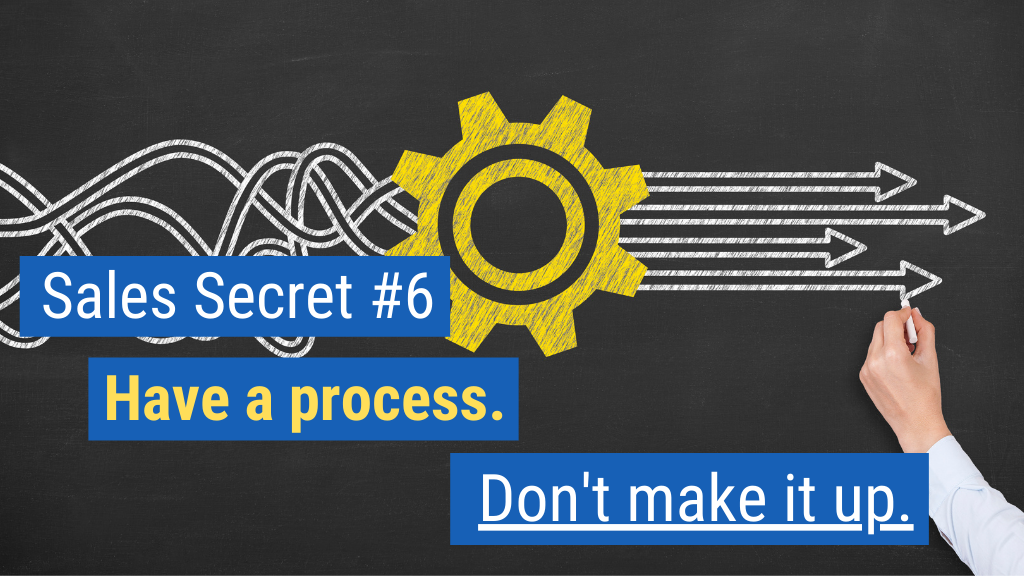 I saved this for last on my list of top sales secrets, because it’s so important. Very few salespeople have a formalized sales process in place. Let me ask you a question: Do you have a formalized sales process where you know exactly what to do at every single phase of the sale? Do you know every question you’re going to ask? Do you know exactly what you’re going to present to your prospects? And if so, is that process working to the degree that you want it to?
I saved this for last on my list of top sales secrets, because it’s so important. Very few salespeople have a formalized sales process in place. Let me ask you a question: Do you have a formalized sales process where you know exactly what to do at every single phase of the sale? Do you know every question you’re going to ask? Do you know exactly what you’re going to present to your prospects? And if so, is that process working to the degree that you want it to?
The truth is, the vast majority of salespeople don’t have a process in place at all. You must commit to having one. Don’t make it up. Use a data-driven approach to more effectively engage prospects in conversation, and ultimately present your solution to the challenges they have mentioned.
You must have a process that takes prospects through a series of questions, and then you must present in a way that’s only geared toward the challenges that they’ve told you about.

Having a process allows you to free up your mental computer, that capacity in your brain, so instead of focusing on what you’re going to say next, you can be totally present and focused on the prospect. That is the distinction between average salespeople and great salespeople. Having a process is what allows you to truly stand out from your competitors.
So, there you have it. Now you know 6 sales secrets your competition doesn’t want you to know. Which of these sales secrets did you find most useful? Be sure to share your thoughts in the comments section to join the conversation.

Enjoyed this article? Please share away!

Get instant access to our free sales training:
Why Prospects Push Back on Price, Give 'Think-It-Overs,' and Ghost in Sales Until They Meet a Sales Superstar Who Is Following These 7 Simple Keys

About the Author Marc Wayshak
Marc is is the best-selling author of three books on sales and leadership, including the highly acclaimed titles Game Plan Selling, The High-Velocity Sales Organization and his forthcoming book, Sales Conversations, Mastered.
Marc is a contributor to Inc, HubSpot, Fast Company, Entrepreneur Magazine, and Huffington Post Business. He also hosts a popular YouTube channel on sales strategy with over 103,000 subscribers.
Marc helps thousands of people his data-driven, science-based approach to selling that utilizes all the best tools available to sales organizations today.

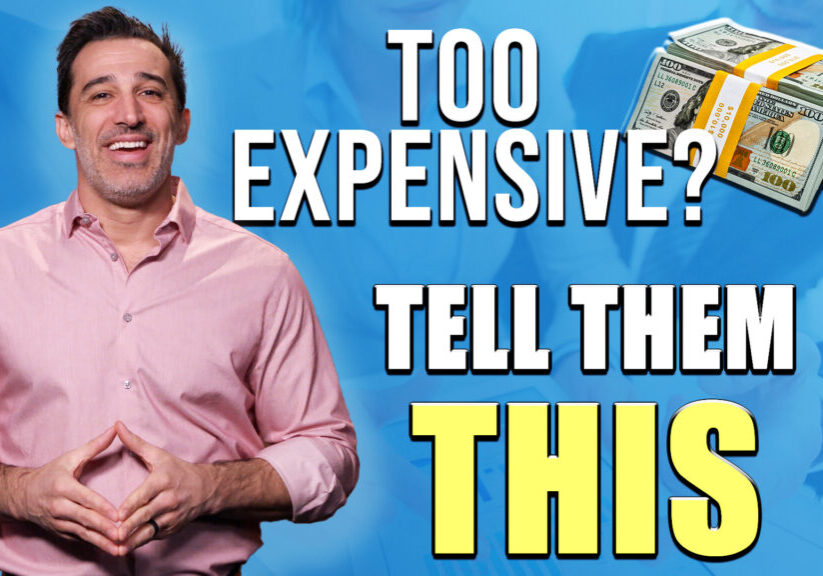
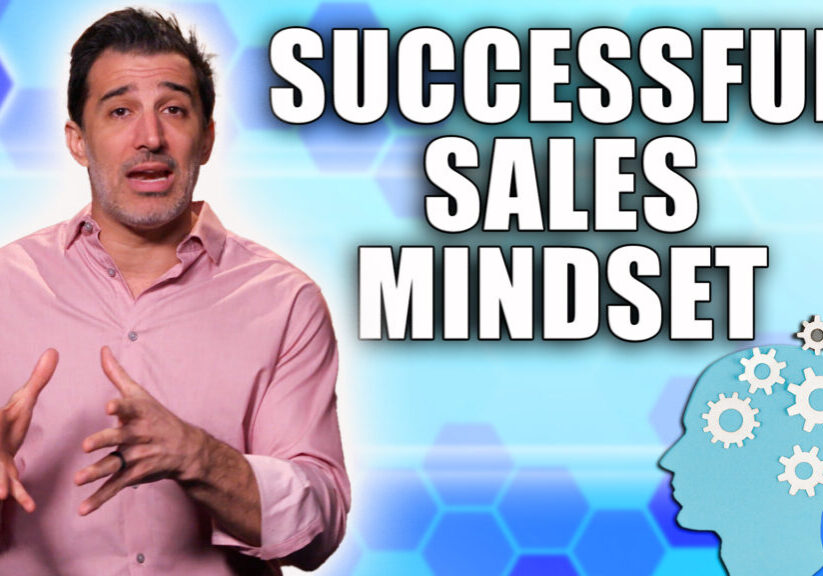
![How-to Sell to Power [C-Suite Sales Must-Knows!] How to Sell to Power [C-Suite Sales Must-Knows!]](https://salesinsightslab.com/wp-content/uploads/bb-plugin/cache/How-to-Sell-to-Power-C-Suite-Sales-Must-Knows-1024x576-landscape-7a52c541b28a7b772ad9e1010d8240be-.jpg)

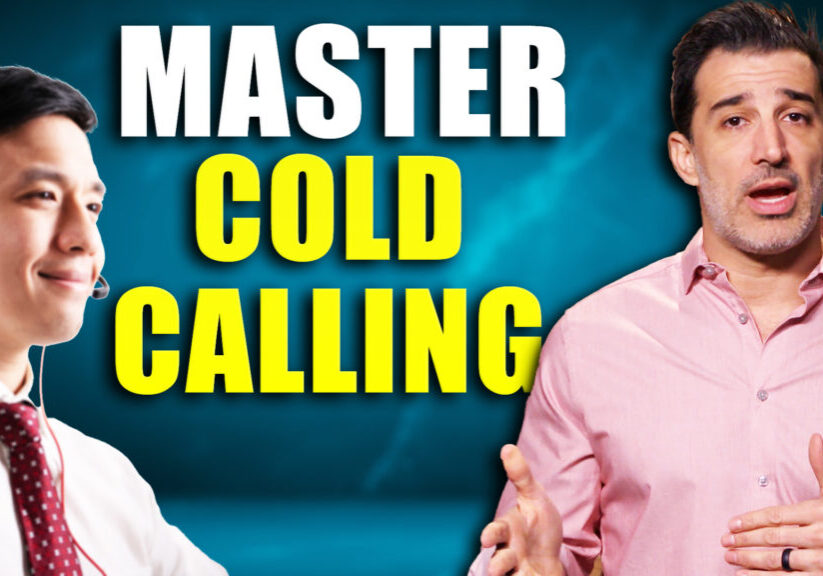
![The Absolute Best Way to Start a Sales Conversation [WITH ANY PROSPECT] The Absolute Best Way to Start a Sales Conversation [WITH ANY PROSPECT]](https://salesinsightslab.com/wp-content/uploads/bb-plugin/cache/The-Absolute-Best-Way-to-Start-a-Sales-Conversation-WITH-ANY-PROSPECT-1024x576-landscape-be9d9379ab94d9f71b5bfeed42246a84-.jpg)